- Home
- Cecelia Ahern
Lyrebird
Lyrebird Read online
Copyright
Published by HarperCollinsPublishers Ltd
1 London Bridge Street
London SE1 9GF
www.harpercollins.co.uk
First published in Great Britain by HarperCollinsPublishers 2016
Copyright © Cecelia Ahern 2016
Jacket design by Heike Schüssler © HarperCollinsPublishers Ltd 2016
Feather illustration based on Simon Cotter’s photograph
Cover images © Shutterstock.com (leaves)
Cecelia Ahern asserts the moral right to be identified as the author of this work.
A catalogue copy of this book is available from the British Library.
This novel is entirely a work of fiction. The names, characters and incidents portrayed in it are the work of the author’s imagination. Any resemblance to actual persons, living or dead, events or localities is entirely coincidental.
All rights reserved under International and Pan-American Copyright Conventions. By payment of the required fees, you have been granted the non-exclusive, non-transferable right to access and read the text of this e-book on screen. No part of this text may be reproduced, transmitted, down-loaded, decompiled, reverse engineered, or stored in or introduced into any information storage and retrieval system, in any form or by any means, whether electronic or mechanical, now known or hereinafter invented, without the express written permission of HarperCollins.
Source ISBN: 9780007501861
Ebook Edition © November 2016 ISBN: 9780007501885
Version: 2016-10-06
Praise for Cecelia Ahern
‘Cleverly constructed, full of flavour and moving’
Daily Mail
‘Beautiful and unexpected … both thought-provoking and life-affirming’
Sunday Express
‘Intricate and emotional … really completely lovely’
Grazia
‘Both moving and thought-provoking’
Irish Independent
‘A must read’
Marie Claire
‘Enchanting’
Good Housekeeping
‘Cecelia Ahern is an undisputed master when it comes to writing about relationships … Moving, real and exquisitely crafted’
Heat
‘Cecelia Ahern’s novels are like a box of emeralds … they are, one and all, dazzling gems’
Adriana Trigiani, author of The Shoemaker’s Wife
‘A wry, dark drama’
Daily Mail
‘Life-affirming, warm and wise’
Good Housekeeping
‘Exceptional … both heartbreaking and uplifting’
Daily Express
‘An unusual and satisfying novel’
Woman
‘An intriguing, heartfelt novel, which makes you think about the value of life’
Glamour
‘Insightful and true’
Irish Independent
‘Ahern demonstrates a sure and subtle understanding of the human condition and the pleasures and pains in relationships’
Barry Forshaw
‘Utterly irresistible … I devoured it in one sitting’
Marian Keyes
‘The legendary Ahern will keep you guessing … a classic’
Company
Dedication
For Paula Pea
It is not the strongest of the species that survives, nor the most intelligent. It is one that is most reponsive to change.
Attributed to Charles Darwin
Table of Contents
Cover
Title Page
Copyright
Praise for Cecelia Ahern
Dedication
Epigraph
Prologue
Part 1
Chapter 1
Chapter 2
Chapter 3
Chapter 4
Chapter 5
Chapter 6
Chapter 7
Chapter 8
Chapter 9
Chapter 10
Chapter 11
Chapter 12
Chapter 13
Chapter 14
Chapter 15
Chapter 16
Chapter 17
Chapter 18
Chapter 19
Chapter 20
Chapter 21
Chapter 22
Chapter 23
Part 2
Chapter 24
Chapter 25
Chapter 26
Chapter 27
Chapter 28
Chapter 29
Chapter 30
Chapter 31
Chapter 32
Chapter 33
Chapter 34
Part 3
Chapter 35
Chapter 36
Chapter 37
Chapter 38
Chapter 39
Chapter 40
Chapter 41
Chapter 42
Part 4
Chapter 43
A Summary
Acknowledgements
Keep Reading
About the Author
Also by Cecelia Ahern
About the Publisher
PROLOGUE
He moves away from the others, their constant chat blending into a tedious monotonous sound in his head. He’s not sure if it’s the jet lag or if he’s simply not interested in what’s going on. It could be both. He feels elsewhere, detached. And if he yawns one more time, she’ll have no hesitation in calling him out on it.
They don’t notice him break away from them, or if they do, they don’t comment. He carries his sound equipment with him; he’d never leave it behind – not just because of its value, but because it’s a part of him by now, like another limb. It’s heavy but he’s used to the weight, oddly is comforted by it. He feels a part of him is missing without it, and walks like he’s carrying the audio bag even when he isn’t, his right shoulder dropped to one side. It might mean he’s found his calling as a sound recordist, but his subconscious connection to it does nothing good for his posture.
He walks away from the clearing, away from the bat house, the cause of the conversation, and moves towards the forest. The fresh cool air hits him as he reaches the edge.
It’s a hot June day, the sun beats down on the top of his head and is baking the naked flesh at the back of his neck. The shade is inviting, a group of midges do high-speed set-dancing in paths of sunlight looking like mythical insects. The woodland floor is cushioned and springy beneath his feet with layers of fallen leaves and bark. He can no longer see the group he left behind and he tunes them out, filling his lungs with the scent of refreshing pine.
He places the audio bag down beside him and leans the boom mic against a tree. He stretches, enjoys the cracks of his limbs and flexing of his muscles. He lifts off his sweater, his T-shirt rising up with it, revealing his stomach, then ties it around his waist. He pulls the hair bobbin from his long hair and ties it up tighter in a topknot, enjoying the air on his sticky neck. Four hundred feet above sea-level he looks out over Gougane Barra and sees tree-covered mountains extending as far as the eye can see, not a sign of a neighbour for miles. One hundred and forty-two hectares of national park. It’s peaceful, serene. He has an ear for sound, has acquired it over time and has had to. He’s learned to listen to what you don’t immediately hear. He hears the birds chirping, the rustle and crack of creatures moving all around him, the low hum of a tractor in the distance, building work hidden in the trees. It’s tranquil, but alive. He inhales the fresh air and as he does he hears a twig snap behind him. He whips around quickly.
A figure darts into hiding behind a tree.
‘Hello?’ he calls out, hearing the aggression in his voice at being caught off guard.
The figure doesn’t
move.
‘Who’s there?’ he asks.
She peeks out briefly from behind the trunk, then disappears again, like she’s playing a game of hide-and-seek. An odd thing happens. He now knows he’s safe but his heart starts pounding; the reverse of what it should be doing.
He leaves his equipment behind and slowly walks towards her, the crunch and snap of the floor beneath him revealing his every move. He makes sure to keep space between them, making a wide circle around the tree she hides behind. Then she comes into full view. She tenses, as if readying herself for defence, but he holds his hands up in the air, palms flat, as though in surrender.
She would almost be invisible or camouflaged in the forest if it weren’t for her white blonde hair and green eyes, the most piercing he’s ever seen. He’s completely captivated.
‘Hi,’ he says, softly. He doesn’t want to scare her away. She seems fragile, on the edge of fleeing, perched on her toes, ready to take off at any moment if he takes a wrong step. So he stops moving, feet rooted to the ground, hands up flat, as if he’s holding up the air, or maybe it’s the air that’s holding him up.
She smiles.
The spell is cast.
She’s like a mythical creature, he can barely see where the tree begins and she ends. The leaves that act as their ceiling flutter in the breeze, causing rippling light effects on her face. They’re seeing each other for the first time, two complete strangers, unable to take their eyes off each other. It is the moment his life splits; who he was before he met her and who he becomes after.
Part 1
One of the most beautiful and rare and probably the most intelligent of all the world’s creatures is that incomparable artist, the Lyrebird … The bird is extremely shy and almost incredibly elusive … characterised by amazing intelligence.
To say that he is a being of the mountains only partially explains him. He is, certainly, a being of the mountains but no great proportion of the high ranges that mark and limit his domain can claim him for a citizen … His taste is so exacting and definite, and his disposition so discriminating, that he continues to be selective in these beautiful mountains, and it was a waste of time to seek him anywhere save in situations of extraordinary loveliness and grandeur.
Ambrose Pratt, The Lore of the Lyrebird
1
That Morning
‘Are you sure you should be driving?’
‘Yes,’ Bo replies.
‘Are you sure she should be driving?’ Rachel repeats, asking Solomon this time.
‘Yes,’ Bo replies again.
‘Is there any chance you could stop texting while you’re driving? My wife is heavily pregnant, the plan is to meet my firstborn,’ Rachel says.
‘I’m not texting, I’m checking my emails.’
‘Oh well then,’ Rachel rolls her eyes, and looks out the window as the countryside races past. ‘You’re speeding. And you’re listening to the news. And you’re jet-lagged to fuck.’
‘Put your seatbelt on if you’re so worried.’
‘Well, that’s reassuring,’ Rachel mumbles as she squeezes her body into the seat behind Bo and clicks her seatbelt into place. She’d rather sit behind the passenger seat where she can keep a better eye on Bo’s driving, but Solomon has the seat pushed so far back that she can’t fit.
‘And I’m not jet-lagged,’ Bo says, finally putting her phone down, to Rachel’s relief. She waits to see Bo’s two hands return to the wheel but instead Bo turns her attention to the radio and flicks through the stations. ‘Music, music, music, why does nobody talk any more?’ she mutters.
‘Because sometimes the world needs to shut up,’ Rachel replies. ‘Well, whatever about you, he’s jet-lagged. He doesn’t know where he is.’
Solomon opens his eyes tiredly to acknowledge them both. ‘I’m awake,’ he says lazily, ‘I’m just, you know …’ he feels his eyelids being pulled closed again.
‘Yeah, I know I know, you don’t want to see Bo driving, I get it,’ Rachel says.
Just off a six-hour flight from Boston, which landed at five thirty this morning, Solomon and Bo had grabbed breakfast at the airport, picked up their car, then Rachel, to drive three hundred kilometres to County Cork in the southwest of Ireland. Solomon had slept most of the way in the plane but it still wasn’t enough, yet every time he’d opened his eyes he’d found Bo wide awake spending every second watching as many in-flight documentaries as she could.
Some people joke about living on pure air. Solomon is convinced that Bo can live on information alone. She ingests it at an astronomical rate, always hungry for it, reading, listening, asking, seeking it out so that it leaves little room for food. She barely eats, the information fuels her but never fills her, the hunger for knowledge and information is never satiated.
Dublin based, Solomon and Bo had travelled to Boston to accept an award for Bo’s documentary, The Toolin Twins, which had won Outstanding Contribution to Film and Television at the Boston Irish Reporter Annual Awards. It was the twelfth award they’d picked up that year, after numerous others they’d been honoured with.
Three years ago they had spent a year following and filming a pair of twins, Joe and Tom Toolin, who were seventy-seven years old at the time. They were farmers who lived in an isolated part of the Cork countryside, west of Macroom. Bo had discovered their story whilst researching for a separate project, and they had quickly taken over her heart, her mind and consequently her life. The brothers lived and worked together all their lives, neither of them had ever had a romantic relationship with a woman, or with anyone for that matter. They had lived on the same farm since birth, had worked with their father and then taken it over when he passed away. They worked in harsh conditions, and lived in a very basic home of humble means, a stone-floored farmhouse, sleeping in twin beds with nothing but an old radio to keep them entertained. They rarely left the land, received their weekly shopping from a local woman who delivered their meagre items, and did general housekeeping. The Toolin brothers’ relationship and outlook on life had torn at the heartstrings of the audience as it had the film crew, for beneath their simplicity was an honest and clear understanding of life.
Bo had produced and directed it under her production company, Mouth to Mouth productions, with Solomon on sound, Rachel on camera. They’d been a team for the past five years since their documentary, Creatures of Habit, which explored the falling number of nuns in Ireland. Bo and Solomon had been romantically involved for the past two years, since the unofficial wrap party of the documentary. The Toolin Twins had been their fifth piece of work but their first major success, and this year they had been travelling the world going from one film festival or awards ceremony to another, where Bo had been accepting awards and had polished her speech to perfection.
And now they’re on the way back to the Toolin twins’ farm which they are so familiar with. But it is not to celebrate their recent successes with the brothers, it is to attend the funeral of Tom Toolin, the youngest brother by two minutes.
‘Can we stop for something to eat?’ Rachel asks.
‘No need.’ Bo reaches down to the floor on the passenger side, dangerously, one hand still on the wheel as the car swerves slightly on the motorway.
‘Jesus,’ Rachel says, not able to watch.
She retrieves three power bars and throws one to her. ‘Lunch,’ she rips hers open with her teeth, and takes a bite. She chews aggressively, as if it’s a pill she must swallow, food for fuel, not food for enjoyment.
‘You’re not human, you know that,’ Rachel says, opening her power bar and studying it with disappointment. ‘You’re a monster.’
‘But she’s my little inhumane monster,’ Solomon says groggily, reaching out to squeeze Bo’s thigh.
She grins.
‘I preferred it when you two weren’t fucking,’ Rachel says, looking away. ‘You used to be on my side.’
‘He’s still on your side,’ Bo says, in a joking tone but meaning it.
Solomon ign
ores the dig.
‘If we’re going to pay our respects to poor Joe, why did you make me pack all my gear?’ Rachel asks, mouth full of nuts and raisins, knowing exactly why but in the mood to stir things up even further. Bo and Solomon were fun like that, never completely stable, always easy to tip.
Solomon’s eyes open as he studies his girlfriend. Two years together romantically, five years professionally and he can read her like a book.
‘You don’t actually think that Bo is going to this funeral out of the goodness of her heart, do you?’ he teases. ‘Award-winning internationally renowned directors have to be receptacles for stories at all times.’
‘That sounds more like it,’ Rachel says.
‘I don’t have a heart of stone,’ Bo defends herself. ‘I re-watched the documentary on the flight. Do you remember who had the final words? Tom. “Any day you can walk away from your bed is a good day.” My heart is broken for Joe.’
‘Fractured, at least,’ Rachel teases, gently.
‘What’s Joe going to do?’ Bo continues, ignoring Rachel’s jab. ‘Who can he talk to? Will he remember to eat? Tom was the one who organised the food deliveries and he cooked.’
‘Tins of soup, beans on toast and tea and toast isn’t exactly cooking. I think Joe will easily be able to take up the gauntlet,’ Rachel smiles, remembering the men sitting down together to shovel hard bread into watery soup in the winter afternoons when darkness had already fallen.

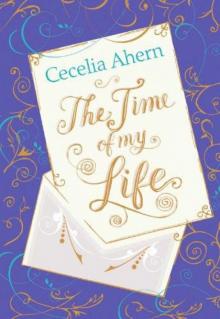 The Time of My Life
The Time of My Life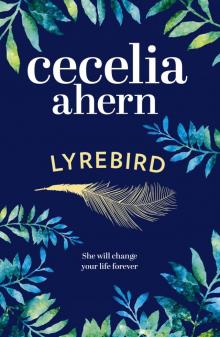 Lyrebird
Lyrebird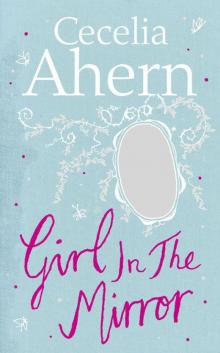 Girl in the Mirror
Girl in the Mirror Perfect
Perfect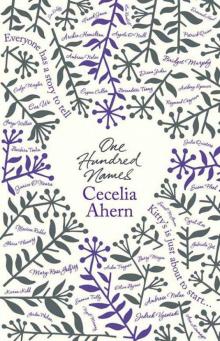 One Hundred Names
One Hundred Names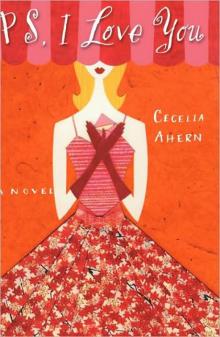 PS, I Love You
PS, I Love You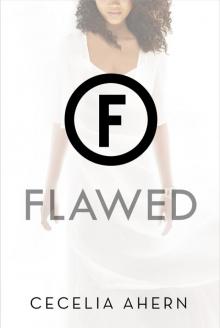 Flawed
Flawed The Book of Tomorrow
The Book of Tomorrow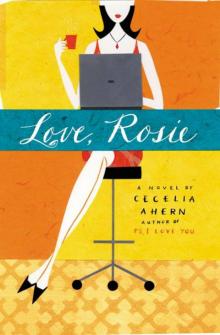 Love, Rosie
Love, Rosie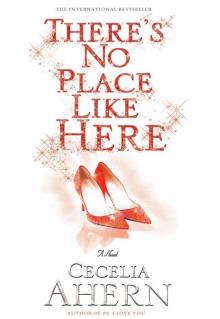 A Place Called Here
A Place Called Here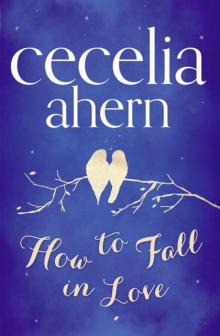 How to Fall in Love
How to Fall in Love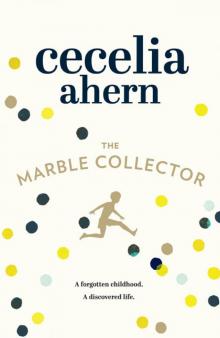 The Marble Collector
The Marble Collector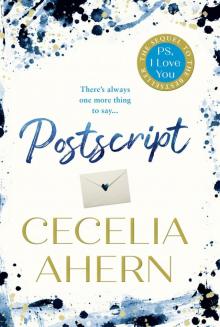 Postscript
Postscript The Gift
The Gift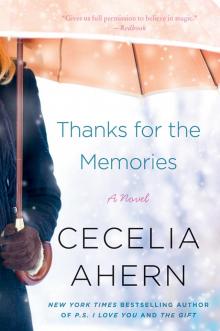 Thanks for the Memories
Thanks for the Memories If You Could See Me Now
If You Could See Me Now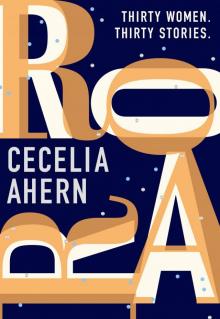 Roar
Roar Cecelia Ahern 2-book Bundle
Cecelia Ahern 2-book Bundle Girl in the Mirror: Two Stories
Girl in the Mirror: Two Stories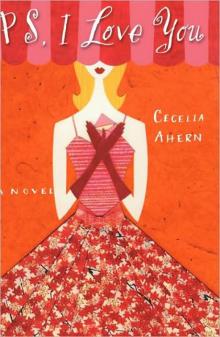 PS, I Love You: A Novel
PS, I Love You: A Novel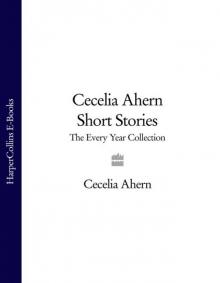 Cecelia Ahern Short Stories
Cecelia Ahern Short Stories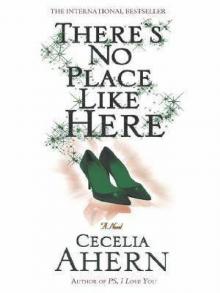 There’s No Place Like Here
There’s No Place Like Here